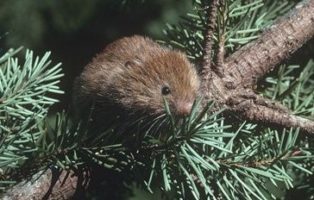For Immediate Release
March 25, 2021
Contact:
Nick Cady, Cascadia Wildlands, (314) 482-3746, email
Noah Greenwald, Center for Biological Diversity, (503) 484-7495, email
Danielle Moser, Oregon Wild, (503) 975-0482, email
Bob Sallinger, Portland Audubon, (503) 380-9728, email
Lawsuit Filed to Protect North Oregon Coast Red Tree Voles
Tree-Dwelling Vole Threatened by Logging, Wildfire, Climate Change
PORTLAND, Ore.— Conservation groups filed a lawsuit today challenging a decision by the Trump administration to deny the north Oregon coast population of red tree voles protection under the Endangered Species Act.
In response to a 2007 petition from the groups, the U.S. Fish and Wildlife Service found the vole warranted protection in 2011, but that such protection was precluded by listing other species. That determination was repeatedly reaffirmed until 2019, when the Trump administration abruptly reversed course and denied protections.
Red tree voles on Oregon’s north coast have been devastated by logging, wildfires and inadequate protections on state and private lands.
“We hope the Biden administration takes a close look at this politically driven decision, which is nothing more than another gift to the timber industry that ignores science,” said Noah Greenwald, the Center for Biological Diversity’s endangered species director. “Protecting the red tree vole means protecting the few remaining old forests on Oregon’s north coast. This benefits not just the vole, but also hundreds of other plants and animals, clean water and our climate.”
Red tree voles live nearly their entire lives in trees and are closely associated with old-growth forests. As one of very few mammals that can subsist entirely on conifer needles, tree voles rarely venture from the treetops to the ground, making them exceedingly vulnerable to logging and forest fragmentation. They have been nearly eliminated on the north coast by the long history of logging and wildfires in the region, including on the Tillamook and Clatsop state forests.
“Clearcut logging has reached record highs across the Tillamook and Clatsop state forests, and recent proposals from the Oregon Department of Forestry seek to explicitly ensure that forests are logged before they can become old-growth,” said Danielle Moser of Oregon Wild. “It’s not enough to just protect what remaining red tree vole habitat there is across Oregon’s north coast forests. We must allow some of the overcut tree plantations to mature, recover and become old-growth forests once again.”
The Oregon Department of Forestry is developing a habitat conservation plan that includes the tree vole but relies on very scant information about where it still remains, providing little assurance that the tree vole and the large blocks of old forest it lives in will be allowed to recover.
“Oregon’s north coast has been extensively logged, and the old forest that remains exists in small, isolated patches that shelter increasingly vulnerable populations of tree voles,” said Nick Cady, legal director of Cascadia Wildlands. “Not only do we need to protect what little habitat exists, but proactively restore larger patches of habitat to allow connectivity between the small, existing populations.”
“The plight of the red tree vole along with other species such as the northern spotted owl and marbled murrelet speak to the fact that the protections that are in place for Oregon’s older forests remain inadequate,” said Bob Sallinger, conservation director for Portland Audubon. “The U.S. Fish and Wildlife Service must follow both the law and the science and provide the red tree vole the protections they warrant before they disappear entirely from Oregon’s North Coast.”
Today’s lawsuit was filed by the Center for Biological Diversity, Oregon Wild, Cascadia Wildlands and Portland Audubon.

###
The Center for Biological Diversity is a national, nonprofit conservation organization with more than 1.7 million members and online activists dedicated to the protection of endangered species and wild places.
Cascadia Wildlands is a grassroots conservation organization that defends and restores Cascadia’s wild ecosystems in the forests, in the courts, and in the streets. We envision vast old-growth forests, rivers full of wild salmon, wolves howling in the backcountry, a stable climate, and vibrant communities sustained by the unique landscapes of the Cascadia bioregion.
Oregon Wild works to protect and restore Oregon’s wildlands, wildlife, and waters as an enduring legacy for future generations.
Audubon Society of Portland was founded in 1902 to promote the understanding, enjoyment and protection of native birds, other wildlife and their habitats.
